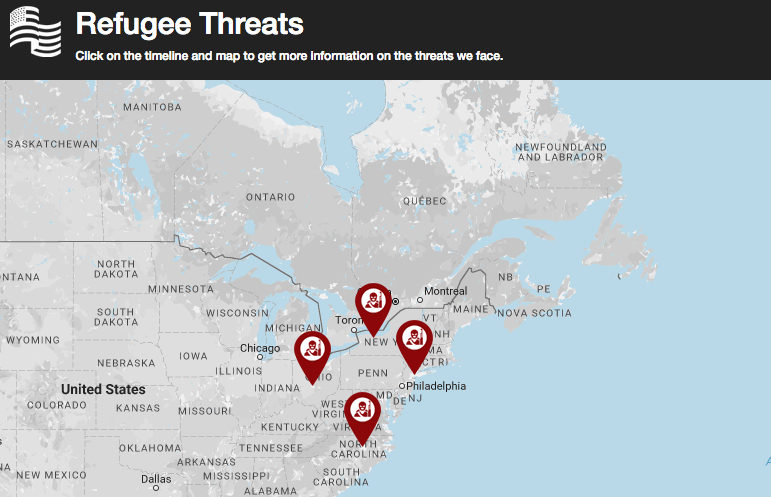
refugeethreat.com
Alleged incidents involving refugees listed on an anti-refugee website. All the mapped episodes actually involved citizens.
Search the Internet for the word “refugee” today and the first option to pop is likely to be a paid ad for refugeethreats.com, which coaxes visitors to sign a petition “stop the Syrian invasion” by displaying maps of crimes reported in Europe and the United States.
The U.S. map lists just four incidents.
They all involve U.S. citizens, none of whom appear to have been refugees*.
You needn’t search that far to find misinformation about refugees online. In a comment to a City Limits story early last year about Syrian refugees in New York, commenter Jason wrote: “We don’t need them. We have our own that need to be taken care of. They cannot be a Muslim and take in western values. This country doesn’t need any more leeches.”
The reality, of course, is that refugees are hardly a major drain on the system. As we reported at the time:
Kelly Agnew-Barajas, director of refugee resettlement at Catholic Charities of the Archdiocese of New York, says that the monetary support allotted for refugees is “breathtakingly low” and leaves refugees scrambling from the get-go. Currently, the federal government grants a one-time stipend of $1,125 per refugee, with the possibility of public assistance thereafter. After years of displacement—and paying the exorbitant fees necessary to secure safe passage out of Syria— many refugees are in dire financial straits by the time they arrive in the U.S. “Many are so worried about getting an income,” says Agnew-Barajas, “they don’t take time to learn English or get integrated. This makes things harder in the long run.”
Fear of refugees is nothing new, but the refugee experience in New York City is not chiefly defined by what the rest of us feel about them.
It’s a much more complicated story—one expertly surveyed by a panel City Limits was proud to moderate at the Brooklyn Historical Society last May that featured Eileen Reilly, director for refugee services and workforce development at CAMBA, Zeinab Eyega, founder and executive director of Sauti Yetu, an advocacy organization for African women and families in NYC, Ninaj Raoul of Haitian Women for Haitian Refugees, and Alec Brook-Krasny, founding executive director of the Council of Jewish Émigré Community Organizations. See the video below:
*Mufid Elfgeeh, a Rochester pizza shop owner who recruited fighters for the Islamic State, came to the U.S. from Yemen when he was 13 and became a citizen the following year. Somali-born Abdirahman Sheik Mohamud, who trained with ISIS and plotted attacks here, became a citizen in 2014. Raees Alam Qazi and Sheheryar Alam Qazi were both naturalized U.S. citizens from Pakistan; they were convicted in 2015 of providing material support to terrorists. All we know of the South Carolina teenager convicted of trying to rob a gun store to further his support for ISIS is that he is a citizen and his family is Syrian.








